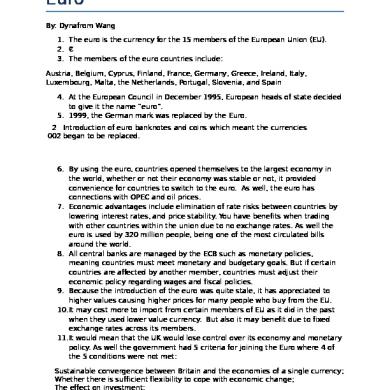Euro
This document was uploaded by user and they confirmed that they have the permission to share it. If you are author or own the copyright of this book, please report to us by using this DMCA report form. Report DMCA
Overview
Download & View Euro as PDF for free.
More details
- Words: 366
- Pages: 2
Euro By: Dynafrom Wang 1. The euro is the currency for the 15 members of the European Union (EU). 2. € 3. The members of the euro countries include: Austria, Belgium, Cyprus, Finland, France, Germany, Greece, Ireland, Italy, Luxembourg, Malta, the Netherlands, Portugal, Slovenia, and Spain 4. At the European Council in December 1995, European heads of state decided to give it the name “euro”. 5. 1999, the German mark was replaced by the Euro. 2 Introduction of euro banknotes and coins which meant the currencies 002 began to be replaced.
6. By using the euro, countries opened themselves to the largest economy in the world, whether or not their economy was stable or not, it provided convenience for countries to switch to the euro. As well, the euro has connections with OPEC and oil prices. 7. Economic advantages include elimination of rate risks between countries by lowering interest rates, and price stability. You have benefits when trading with other countries within the union due to no exchange rates. As well the euro is used by 320 million people, being one of the most circulated bills around the world. 8. All central banks are managed by the ECB such as monetary policies, meaning countries must meet monetary and budgetary goals. But if certain countries are affected by another member, countries must adjust their economic policy regarding wages and fiscal policies. 9. Because the introduction of the euro was quite stale, it has appreciated to higher values causing higher prices for many people who buy from the EU. 10.It may cost more to import from certain members of EU as it did in the past when they used lower value currency. But also it may benefit due to fixed exchange rates across its members. 11.It would mean that the UK would lose control over its economy and monetary policy. As well the government had 5 criteria for joining the Euro where 4 of the 5 conditions were not met: Sustainable convergence between Britain and the economies of a single currency; Whether there is sufficient flexibility to cope with economic change; The effect on investment;
The impact on our financial services industry; Whether it is good for employment;
6. By using the euro, countries opened themselves to the largest economy in the world, whether or not their economy was stable or not, it provided convenience for countries to switch to the euro. As well, the euro has connections with OPEC and oil prices. 7. Economic advantages include elimination of rate risks between countries by lowering interest rates, and price stability. You have benefits when trading with other countries within the union due to no exchange rates. As well the euro is used by 320 million people, being one of the most circulated bills around the world. 8. All central banks are managed by the ECB such as monetary policies, meaning countries must meet monetary and budgetary goals. But if certain countries are affected by another member, countries must adjust their economic policy regarding wages and fiscal policies. 9. Because the introduction of the euro was quite stale, it has appreciated to higher values causing higher prices for many people who buy from the EU. 10.It may cost more to import from certain members of EU as it did in the past when they used lower value currency. But also it may benefit due to fixed exchange rates across its members. 11.It would mean that the UK would lose control over its economy and monetary policy. As well the government had 5 criteria for joining the Euro where 4 of the 5 conditions were not met: Sustainable convergence between Britain and the economies of a single currency; Whether there is sufficient flexibility to cope with economic change; The effect on investment;
The impact on our financial services industry; Whether it is good for employment;
Related Documents

Euro
May 2020 30
Euro
November 2019 41
Euro
December 2019 32
Euro
August 2019 45
Euro Pass
November 2019 28
Cijenik - Euro
June 2020 11More Documents from ""

Data Homework 2 1
October 2019 58
Money Supply
December 2019 59
Sectors Of Economy
October 2019 58
Travel Advisories
April 2020 36
Laws Of .. (economics)
October 2019 55